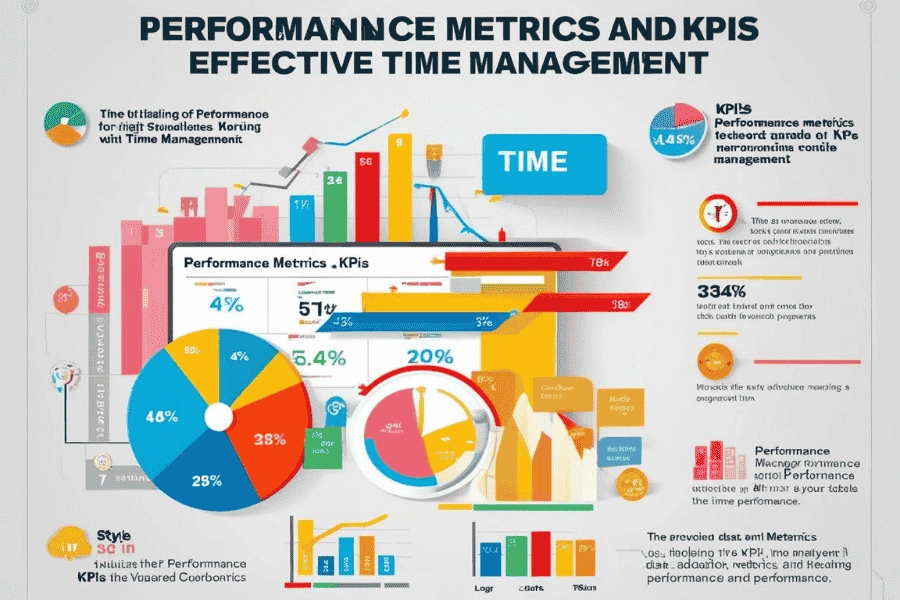Utilizing Performance Metrics and KPIs for Time Management
Introduction
In today’s results-driven environments, effective time management is not just about working harder—it’s about working smarter. Performance metrics and Key Performance Indicators (KPIs) play a crucial role in evaluating how time is spent and how efficiently goals are being achieved. By leveraging data-backed insights, individuals and organizations can pinpoint inefficiencies, monitor progress, and implement improvements that optimize time usage and enhance productivity.

Understanding Metrics and KPIs in Time Management
Performance metrics are quantifiable measures used to assess progress toward specific objectives, while KPIs are key indicators that reflect critical success factors. In the context of time management, these tools help track how time is allocated, identify patterns in productivity, and measure the effectiveness of time-related strategies. When correctly defined and consistently monitored, KPIs and metrics transform vague notions of “being busy” into clear evidence of performance and outcomes.
Key Time Management KPIs
There are several KPIs that are particularly useful for evaluating time management. Time spent on high-priority tasks versus low-priority ones helps assess alignment with strategic goals. Task completion rate measures how many planned tasks are finished within a set timeframe, providing insight into daily or weekly productivity. Time to completion for individual tasks or projects highlights efficiency and helps identify delays. Other valuable KPIs include meeting efficiency (time spent vs. outcomes achieved), distraction frequency, and utilization rate, which reflects the percentage of work hours spent on productive activities.
Tracking and Analyzing Time-Based Metrics
To effectively utilize KPIs for time management, consistent tracking is essential. Time-tracking software, calendars, project management tools, and performance dashboards provide the necessary data to monitor and analyze time usage. Analyzing trends over time allows for deeper insights into behavioral patterns, workload balance, and productivity bottlenecks. These insights enable data-driven decisions, such as reallocating resources, eliminating low-value activities, or adjusting schedules for optimal performance.
Benefits of Using KPIs for Time Optimization
Applying performance metrics and KPIs to time management brings multiple benefits. It introduces objectivity into performance reviews and planning processes, helping to identify not only what is being done, but how effectively it is being accomplished. KPIs also promote accountability by setting clear expectations and standards. Additionally, they help motivate teams and individuals by showcasing tangible progress and areas of improvement. When used strategically, KPIs can also support better delegation, improve prioritization, and ensure a healthier balance between urgent tasks and long-term goals.
Challenges and Best Practices
While KPIs are powerful tools, their effectiveness depends on thoughtful selection and interpretation. Poorly defined or overly complex metrics can lead to confusion and misalignment. It’s important to choose KPIs that are relevant, specific, and tied directly to time management goals. Regular reviews and updates to these indicators help keep them aligned with evolving responsibilities and organizational priorities. Furthermore, integrating both qualitative and quantitative feedback can provide a more holistic view of time performance.
Conclusion
Performance metrics and KPIs are essential tools for effective time management. By offering measurable, actionable insights into how time is used, they help individuals and organizations maximize efficiency and productivity. When combined with consistent tracking and strategic decision-making, these metrics not only highlight areas of improvement but also empower users to make meaningful changes that drive results and foster long-term success.
Active Events
3 Essential Projects to Elevate Your 5c of Content Marketing Portfolio
Date: Aug 05, 2025 | 7:00 PM(IST)
7:00 PM(IST) - 8:10 PM(IST)
2432 people have registered
3 Must Have Projects On your CV to Get into Data Analysis
Date: Aug 05, 2025 | 7:00 PM(IST)
7:00 PM(IST) - 8:10 PM(IST)
2753 people have registered
Bootcamps
Digital Marketing Bootcamp
- Duration:4 Months
- Start Date:Aug 09, 2025
Data Science Bootcamp
- Duration:4 Months
- Start Date:Aug 09, 2025
